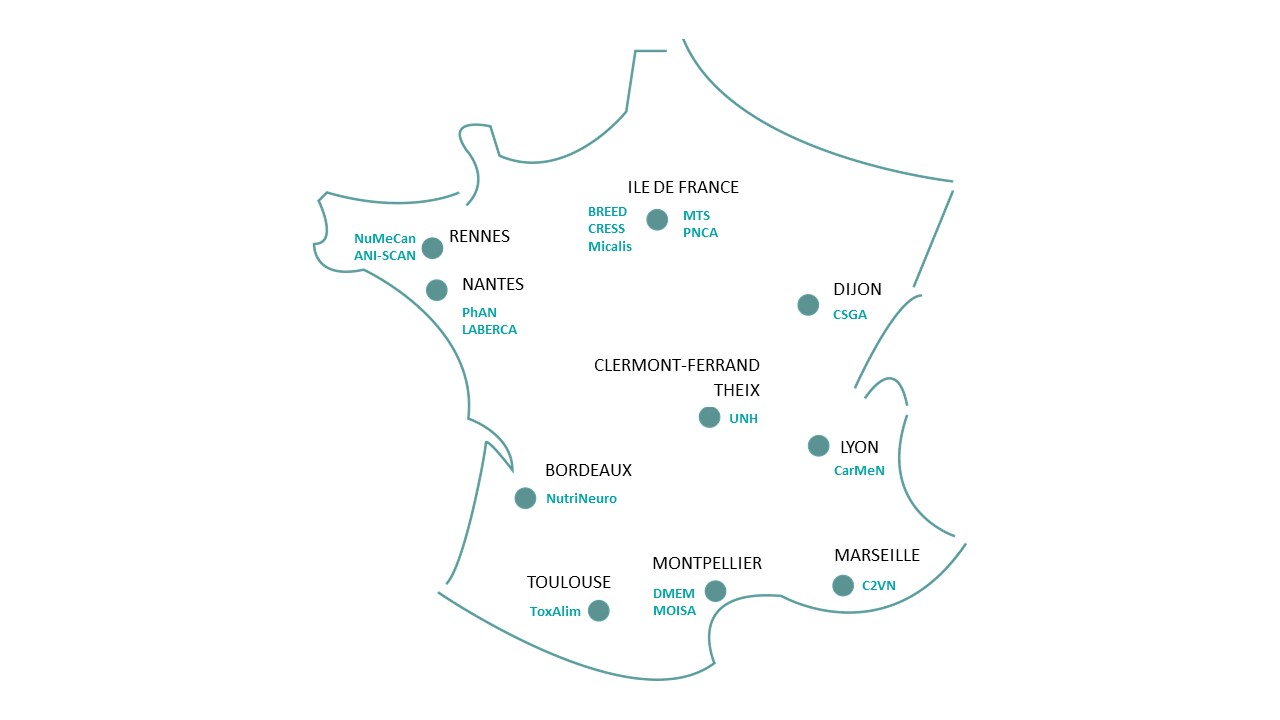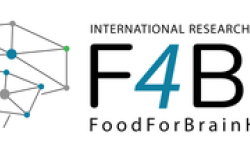The Human Nutrition and Food Safety Division

Research teams
The 16 research units are located throughout France. Four centres group several units or teams around the division's specific themes:
- Dijon: sensory properties of food, perception, memory and impact on food behaviour and choice.
- Clermont-Ferrand - Theix: role of diet in the prevention of metabolic changes, mainly due to ageing.
- Toulouse: study of xenobiotics, quantification of exposure and characterisation of their metabolism.
- Paris: biological, sociological and economic determinants of eating behaviour.
List of units
| ANI-SCAN | Unité de service scanographie |
| BREED | Biology of Reproduction, Environment, Epigenetics and Development |
| C2VN | Center for cardiovascular and nutrition research |
| CarMeN | Cardiovascular diseases, metabolism, diabetology and nutrition |
| CRESS | Centre of Research in Epidemiology and StatisticS |
| CSGA | Center for Taste and Feeding Behavior |
| DMEM | Muscle Dynamics and Metabolism |
| LabERCA | Residues and Contaminants in Food |
| MicAliS | Microbiology of Food for Health |
| MOISA | Montpellier Interdisciplinary Center on Sustainable Agri-food systems (social and nutritional sciences) |
| MTS | Food immuno-allergy unit |
| NUMECAN | Nutrition, Metabolism and Cancer |
| NutriNeuro | Nutrition and Integrative Neurobiology |
| PhAN | Physiology of Nutritional Adaptations |
| PNCA | Physiology of Nutrition and Food Behavior |
| ToxAlim | Food Toxicology |
| UNH | Human Nutrition |
Location of units

Platforms and networks

Platform Nutrinet Santé
This is a cohort study carried out on a large population of adult volunteers (who become “Nutrinauts” by registering), with the aim of studying the relationship between nutrition and health. Nutrinauts are monitored through the NutriNet-Health website for the duration of the study, which allows participants to provide all the information needed for researchers to move forward with their research programmes, easily and free of charge.
Platform Chemosens
ChemoSens conducts research programmes to develop original methods and tools for the physical-chemical and organoleptic characterisation of foods. As a platform, ChemoSens participates in research with private or public partners to understand the biological, physicochemical and psychophysical mechanisms of the sensory perception of food, and studies the effects of this perception of food on consumer preferences and eating behaviour.
International structures

International Research Network FOOD4BRAIN HEALTH
The Food4BrainHealth International Research Network (IRN) is an offshoot of the OptiNutribrain International Associated Laboratory (LIA) and brings together leaders in the fields of neuroscience and nutrition from France and Canada. Food4BrainHealth aims to provide sound scientific data to define the basis for optimised nutrition for brain health. This initiative will bring together leading public research institutions to promote scientific interactions between multidisciplinary groups from both countries.

International Associated Laboratory OptiNutriBrain
The OptiNutriBrain International Associated Laboratory (LIA) is a joint initiative of the Institute of Nutrition and Functional Foods of Laval University (INAF) and NutriNeuro from the National Institute for Agricultural Research (INRA) and the University of Bordeaux. OptiNutriBrain aims to be a world reference in the field of nutrition and brain health.
International Associated Laboratory BACT-INFLAM
This international laboratory associating the Federal University of Minas Gerais in Brazil and INRAE's STLO and MICALIS units aims to gain a better understanding of the involvement of bacteria in the pro- or anti-inflammatory processes associated with chronic inflammatory bowel disease (IBD) and mastitis, two major diseases in human and animal health respectively. The Bact-Inflam project thus aims to develop new therapeutic strategies and alternatives to allopathic treatments. Indeed, beneficial bacteria, such as certain lactic or propionic bacteria or commensal bacteria of the intestine, have activities that could be used to prevent IBD or mastitis, or as supplements or alternatives to treatments (including antibiotics) used against these diseases.
International Associated Laboratory Protein and nutrition security
The LIA "Protein and nutrition security" associates the PNCA unit and St John's Research Institute in Bangalore since 2019. Its objectives are to provide reference data on the protein and amino acid requirements of different populations in different physiological, pathological and environmental situations. Another object of study is the metabolic bioavailability of amino acids from different dietary sources of protein currently available in different regions of the world, or under development as alternative sources to ensure the nutritional security of future populations. Finally, scientists are working on the analysis of these data to develop nutritional recommendations that take into account the nutritional needs of populations and the sustainability issues related to agricultural production and food production.
